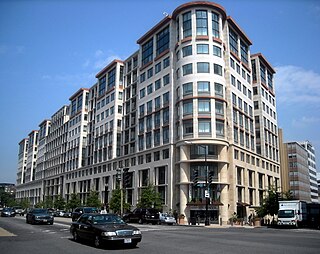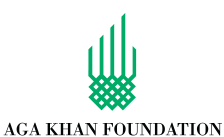Related Research Articles

The International Finance Corporation (IFC) is an international financial institution that offers investment, advisory, and asset-management services to encourage private-sector development in less developed countries. The IFC is a member of the World Bank Group and is headquartered in Washington, D.C. in the United States.

Microcredit is the extension of very small loans (microloans) to impoverished borrowers who typically lack collateral, steady employment, and a verifiable credit history. It is designed to support entrepreneurship and alleviate poverty. Many recipients are illiterate, and therefore unable to complete paperwork required to get conventional loans. As of 2009 an estimated 74 million people held microloans that totaled US$38 billion. Grameen Bank reports that repayment success rates are between 95 and 98 percent. The first economist who had invented the idea of micro loans was Jonathan Swift in the 1720’s. Microcredit is part of microfinance, which provides a wider range of financial services, especially savings accounts, to the poor. Modern microcredit is generally considered to have originated with the Grameen Bank founded in Bangladesh in 1983. Many traditional banks subsequently introduced microcredit despite initial misgivings. The United Nations declared 2005 the International Year of Microcredit. As of 2012, microcredit is widely used in developing countries and is presented as having "enormous potential as a tool for poverty alleviation." Microcredit is a tool that can possibly be helpful to reduce feminization of poverty in developing countries.

Microfinance consists of financial services targeting individuals and small businesses who lack access to conventional banking and related services. Microfinance includes microcredit, the provision of small loans to poor clients; savings and checking accounts; microinsurance; and payment systems, among other services. Microfinance services are designed to reach excluded customers, usually poorer population segments, possibly socially marginalized, or geographically more isolated, and to help them become self-sufficient. ID Ghana is an example of a microfinance institution.

Punjab National Bank is an Indian government public sector bank based in New Delhi. It was founded in May 1894 and is the second-largest public sector bank in India in terms of its business volumes, with over 180 million customers, 12,248 branches, and 13,000+ ATMs.
Grameen Bank is a microfinance specialized community development bank founded in Bangladesh. It provides small loans to the impoverished without requiring collateral.
HBL Microfinance Bank Ltd (HBL MfB) is a Pakistani microfinance bank headquartered in Islamabad. HBL MfB operates over 200 locations all over Pakistan. It is one of the oldest microfinance bank in the country with its roots in the credit and saving section of the Agha Khan Rural Support Program (AKRSP).

The Aga Khan Foundation (AKF) is a private, not-for-profit international development agency, which was founded in 1967 by Shah Karim Al Hussaini, Aga Khan IV, the 49th Hereditary Imam of the Shia Ismaili Muslims. AKF seeks to provide long-term solutions to problems of poverty, hunger, illiteracy and ill health in the poorest parts of South and Central Asia, Eastern and Western Africa, and the Middle East. In these regions, the needs of rural communities in mountainous, coastal and resource poor areas are given particular attention. The Foundation's activities often reinforce the work of other sister agencies within the Aga Khan Development Network (AKDN). While these agencies are guided by different mandates pertaining to their respective fields of expertise, their activities are often coordinated with one another in order to "multiply" the overall effect that the Network has in any given place or community. AKF also collaborates with local, national and international partners in order to bring about sustainable improvements of life in the 14 countries in which it implements programmes. The Foundation's head office is located in Geneva, Switzerland.
Akhter Hameed Khan was a Pakistani development practitioner and social scientist. He promoted participatory rural development in Pakistan and other developing countries, and widely advocated community participation in development. His particular contribution was the establishment of a comprehensive project for rural development, the Comilla Model (1959). It earned him the Ramon Magsaysay Award from the Philippines and an honorary Doctorate of law from Michigan State University.
Aga Khan Agency for Microfinance (AKAM) is a microfinancing agency of the Aga Khan Development Network.
Poverty in Pakistan has been recorded by the World Bank at 39.3% using the lower middle-income poverty rate of US$3.2 per day for the fiscal year 2020–21. In September 2021, the government stated that 22% percent of its population lives below the national poverty line set at Rs. 3030 (US$10) per month.
Wizzit is a provider of basic banking services for the unbanked and underbanked in South Africa. Its services are based on the use of mobile phones for accessing bank accounts and conducting transactions, in addition to a Maestro debit card that is issued to all customers upon registration. Wizzit is a branchless banking business, meaning that its services are designed so that customers can generally conduct transactions without the need to visit bank branches.

Deutsche Investitions- und Entwicklungsgesellschaft (DEG) is a Development Finance Institution (DFI) and a subsidiary of KfW Group. It was founded in Cologne in September 1962 as a federally owned company by the former Federal President Walter Scheel. Since its foundation, DEG has been headquartered in Cologne. In 2008, DEG moved into a modern, energy efficient office building in the city centre. DEG has 20 representative offices across the world, inter alia in Bangkok, Beijing, Istanbul, Jakarta, Johannesburg, Lagos, Lima, Mexico City, Nairobi, New Delhi, São Paulo and Singapore. In 2021, DEG employed a staff of approximately 650, both in Germany and abroad. DEG generated new business totaling EUR 1.5 billion in 2021 and the balance sheet total amounted to EUR 5.328 billion. Since its foundation, DEG has co-financed almost 1,300 companies in more than 120 countries.

Shoaib Sultan Khan NI is one of the pioneers of rural development programmes in Pakistan. As a CSP Officer, he worked with the Government of Pakistan for 25 years, later on he served Geneva based Aga Khan Foundation for 12 years, then UNICEF and UNDP for 14 years. Since his retirement, he has been involved with the Rural Support Programmes (RSPs) of Pakistan full-time, on voluntary basis. Today, the Rural Support Programmes have helped form 297,000 community organisations in 110 districts including two Federally Administered Tribal Areas of Pakistan.

The Benazir Income Support Programme (BISP) is a federal unconditional cash transfer poverty reduction program in Pakistan. Launched in July 2008, it was the largest single social safety net program in the country with nearly Rs. 90 billion distributed to 5.4 million beneficiaries in 2016.
Prime Minister's Youth Programme is an initiative by the former prime minister of Pakistan Nawaz Sharif established in 2013. The purpose of the programme is to ensure the provision of quality education, and meaningful employment to the youth through integrated, sustainable youth initiatives. The programme provided government-subsidised business loans of up to 25 million rupees, under three tiers: first-tier for 10000 to 1 million, the second tier for 1 million to 10 million, and the third tier for 10 million to 25 million. The programme also provided a skills scholarship program, a talent hunt for youth sports, and a national youth council.

Kashf Foundation is a non-profit organization, founded by Roshaneh Zafar in 1996. Kashf is regarded as the first microfinance institution (MFI) of Pakistan that uses village banking methodology in microcredit to alleviate poverty by providing affordable financial and non-financial services to low income households - particularly for women, to build their capacity and enhance their economic role. With headquarters in Lahore, Punjab, Kashf have regional offices in five major cities and over 200 branches across Pakistan.

Advans SA is a microfinance bank based in Luxembourg active in a number of developing countries. It was established in 2005.

Vietnam joined the World Bank Group (WBG) on 21 September 1956. Before the mid-1980s, Vietnam was one of the world's least developed countries. A series of economic and political reforms launched in 1986, known as Đổi Mới, caused Vietnam to experience rapid economic growth and development, becoming a lower middle-income country. The World Bank (WB) has maintained a development partnership with Vietnam since 1993. As of 25 March 2019, it has committed a total of US$24 billion in loans, credits, and grants to Vietnam through 165 operations and projects, 44 of which are active as of 2019 and comprise US$9 billion. With an estimated extreme poverty rate below 3% and a GDP growth rate of 7.1% in 2018, Vietnam's economy continues to show fundamental strength and is supported by robust domestic demand and export-oriented manufacturing.
Muhammad Amjad Saqib, is a Pakistani social entrepreneur, development practitioner, former civil servant and author. He is the founder and executive director of Akhuwat Foundation, which is the world's largest Islamic microfinance organization that provides interest-free loans to the most deserving segments of society.
Akhuwat Foundation, a nonprofit organization based in Pakistan, offers interest-free loans to individuals who lack access to formal financial services. Founded in 2003 by Dr. Muhammad Amjad Saqib, who serves as the executive director, Akhuwat operates its head office in Lahore and has expanded to over 1,500 cities in Pakistan.
References
- ↑ Naseem, Syed Mohammad (1998). Dilemmas of Destiny: Domestic and Global Challenges Facing Pakistan's Economy. S.M. Naseem. ISBN 978-969-402-316-8.
- ↑ Narayan-Parker, Deepa; Glinskaya, Elena E. (2007). Ending Poverty in South Asia: Ideas that Work. World Bank Publications. ISBN 978-0-8213-6877-0.
- ↑ Webmaster (27 April 2017). "NRSP Microfinance Bank extends services for unbanked masses - PakObserver".
- ↑ "Microfinance | National Rural Support Programme". nrsp.org.pk. Retrieved 2021-12-30.
- ↑ "NRSP Microfinance Bank: SBP allows nationwide operations - The Express Tribune". 4 March 2011.
- ↑ Report, Recorder (2021-12-30). "NRSP MF Bank: BoP mulling acquiring strategic stake". Brecorder. Retrieved 2021-12-30.
- ↑ "IFC Partnership with Microfinance Bank Brings Hope to Pakistan's Farme". www.ifc.org. Retrieved 2021-12-30.
- ↑ "Acumen | Companies -". Acumen. Retrieved 2021-12-30.
- ↑ "NRSP Bank | Proparco - Groupe Agence Française de Développement". www.proparco.fr. Retrieved 2021-12-30.